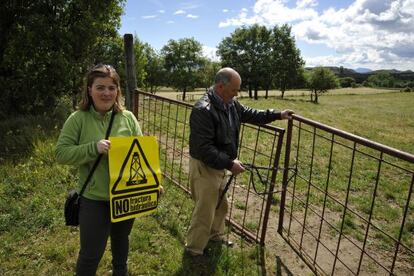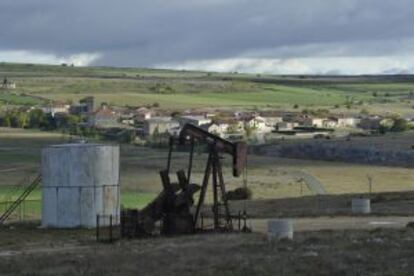Fracking firm’s advances raising fear in northern Spain
US company threatens to expropriate local people’s land to extract the region’s gas potential

On May 14, Janet Ortiz, who runs a cattle farm in an area known as Las Merindades, in Burgos, northern Spain, received a letter from a law firm advising her to sell her 3.5-hectare holding or face the risk of it being “forcibly expropriated.” She contacted the law firm, and was told that it represented BNK Petroleum, a US hydrocarbons company that wants to extract gas in the area via fracking, a method that involves forcing water and air into underground shale deposits to extract gas trapped there. The practice has met with widespread opposition in much of Europe, as well as among Ortiz’s neighbors.
Ortiz posted the letter on the social networks, and it was soon being discussed throughout Las Merindades, an area rich in hydrocarbons, which has been explored for the last century: Spain’s only onshore oil well is located at Ayoluengo, 60 kilometers from Ortiz’s home, and has been producing since 1964.
Ortiz’s strategy of bringing the threat of fracking out in the open put BNK on the back foot, which was obliged, through its law firm, to apologize for threatening to expropriate her land. But local people are now very wary. “Janet’s letter has got us all worried,” says Pepe Casado, a local councilor and member of a local action group set up to prevent fracking in Las Merindades: “We know the wolf is at the door.” The local council, run by the Popular Party, has been forced to declare Las Merindades a non-fracking zone, even though the move has no legal validity.
Around 20 percent of the gas in Spain could be in the north of Burgos”
The letter Ortiz received surprises few local people: they have seen this coming for some time. Companies that want to extract gas through fracking must first undertake an environmental impact study before they can even test to see how much gas is under the ground. Given the widespread hostility to fracking, it makes more sense for them simply to buy land, an approach that BNK admits to pursuing. “People are worried, and they are right to be,” says José Ignacio Angulo, spokesman for around 150 regional associations that on May 2 signed a manifesto opposing fracking in Las Merindades.
Fracking, or hydraulic fracturing, is widespread throughout the United States, and has allowed the country to significantly reduce its dependence on imported gas. But it has also sparked controversy. A 2011 report by the European Parliament on fracking highlighted some of the risks from pumping water, sand and chemicals three kilometers underground: contaminated water tables, atmospheric pollution and even small earthquakes.
Ortiz says she never saw herself as an anti-fracking campaigner, but believes that now she has no choice. “I want people to know that I make my living off the land, and that if this farm is taken from me I will not be able to work,” she says, looking out over rolling green hills and the impressive Tesla Mountains in the distance. “Water just comes up to the surface here, because there are huge aquifers below,” says her father, José Manuel Ortiz, indicating a fence he has constructed round the spring that rises up in the middle of his land to keep his 75 cattle out.
Fracking requires huge amounts of water, which may explain why the Ortiz family’s property attracted the attention of BNK. The company says it intended to reach a deal with the family, and that the wording of the letter was unfortunate. However, it immediately added that hydrocarbon exploration can be declared of public interest by the government, meaning that land can, by law, be temporarily expropriated. “Around 20 percent of the gas in Spain could be in the north of Burgos,” says a BNK spokesman, adding that in the coming months the firm will present the environmental impact studies that will allow it to begin initial explorations in the neighboring Basque Country. The company also points out that Spain could reduce its gas imports considerably if it began exploiting its reserves. A recent report by Deloitte estimates that gas and oil extracted from offshore platforms in the Canary Islands and the Balearics could generate 250,000 jobs in Spain.
There are between 10 and 15 projects on the table, but so far the Industry Ministry has yet to approve gas extraction through fracking. The regional government of Castilla y León says the most advanced project, which has been given two authorizations to undertake exploration, is in Sedano, close to the city of Burgos. At the moment, a report into the environmental impact of exploration is being processed. The office of the secretary of state for the environment says that 12 other studies on the environmental impact of fracking are being looked at.

Ayoluengo de la Lora, where oil was discovered half a century ago, is about 20 kilometers from Sedano. At one point it was producing around 5,000 barrels a day, but output has fallen to around 100 barrels. The area is littered with nodding donkey wells, making a sputtering noise, similar to a car about to cut out, as well as makeshift windmills that help with the pumping.
Francisco Javier Hidalgo was 14 when the oil was discovered. He has lived in the village all his life. He remembers when the Americans came. “They set up a bar next to the first pump, and there was more whisky flowing than wine,” he says as we walk along a windswept, deserted road. “But it really only brought wealth to about 10 or 12 people, for everybody else it was a disaster.” He says his father’s wheat field was expropriated. “And it all came to nothing. We didn’t make any money out of the oil”
Likewise, Janet Ortiz fears that what the international media has dubbed Spain’s energy fever will bring little good to her community if their land is expropriated and she is forced off her farm.
Tu suscripción se está usando en otro dispositivo
¿Quieres añadir otro usuario a tu suscripción?
Si continúas leyendo en este dispositivo, no se podrá leer en el otro.
FlechaTu suscripción se está usando en otro dispositivo y solo puedes acceder a EL PAÍS desde un dispositivo a la vez.
Si quieres compartir tu cuenta, cambia tu suscripción a la modalidad Premium, así podrás añadir otro usuario. Cada uno accederá con su propia cuenta de email, lo que os permitirá personalizar vuestra experiencia en EL PAÍS.
¿Tienes una suscripción de empresa? Accede aquí para contratar más cuentas.
En el caso de no saber quién está usando tu cuenta, te recomendamos cambiar tu contraseña aquí.
Si decides continuar compartiendo tu cuenta, este mensaje se mostrará en tu dispositivo y en el de la otra persona que está usando tu cuenta de forma indefinida, afectando a tu experiencia de lectura. Puedes consultar aquí los términos y condiciones de la suscripción digital.









































